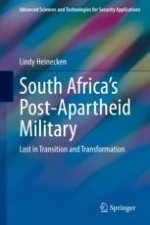2020 | OriginalPaper | Buchkapitel
9. Military Unions: Moving from Accommodation to Confrontation to Subversion
verfasst von : Lindy Heinecken
Erschienen in: South Africa's Post-Apartheid Military
Aktivieren Sie unsere intelligente Suche, um passende Fachinhalte oder Patente zu finden.
Wählen Sie Textabschnitte aus um mit Künstlicher Intelligenz passenden Patente zu finden. powered by
Markieren Sie Textabschnitte, um KI-gestützt weitere passende Inhalte zu finden. powered by
